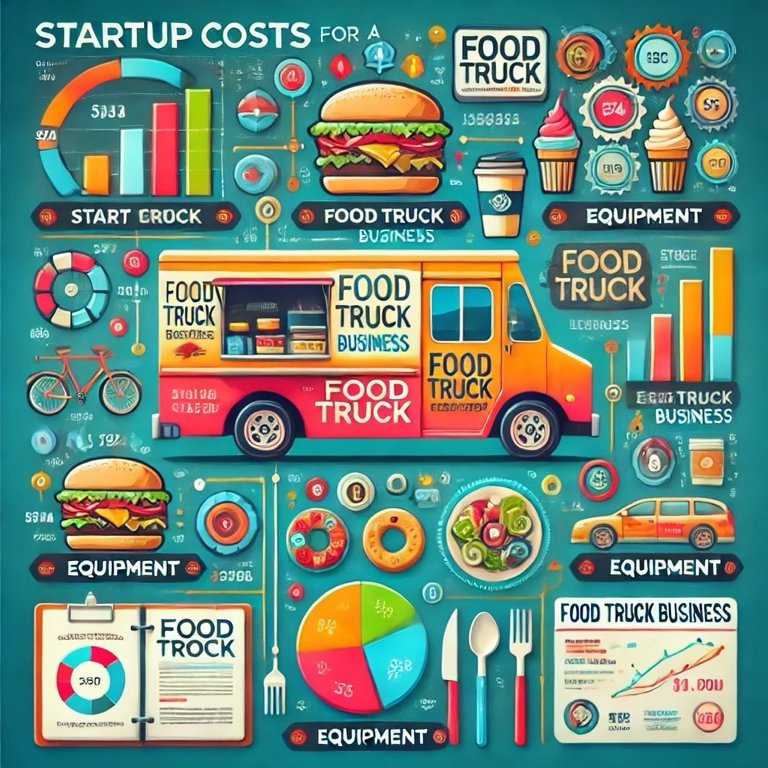Table of Contents
ToggleSo You Want to Start a Food Truck Business in Florida?
Starting a food truck business is an exhilarating journey that combines culinary passion with entrepreneurial spirit. If you’re a young culinary entrepreneur dreaming of hitting the road with your unique flavors, this guide is your roadmap to success. We’ll explore the essential costs, potential revenue, necessary permits, and other crucial details to help you start a food truck in Florida.
Costs to Start a Food Truck Business
Starting a food truck business involves several key expenses. First and foremost, purchasing the truck itself. The cost of a food truck can range from $50,000 to $150,000, depending on whether it’s new or used and the type of equipment included. But that’s just the beginning!

Next, you’ll need to equip your truck with all the necessary kitchen tools. The cost of outfitting your truck can range from $10,000 to $20,000. Don’t forget the all-important truck wrapping, which costs between $2,000 and $5,000. This investment not only protects your vehicle but also transforms it into a rolling advertisement for your brand.
Licenses and permits are another significant expense. In Florida, you can expect to spend between $1,864 and $28,276 annually on various permits, including health and safety permits, business licenses, and parking permits. Commissary kitchens, essential for food prep and storage, will add another $500 to $1,500 to your monthly budget.

Revenue and Profit Margins
Once your food truck is up and running, the revenue potential is substantial. The average annual revenue for a food truck ranges from $250,000 to $500,000. With careful management and a popular menu, some trucks even surpass these figures. Profit margins typically fall between 6% and 9%, making this a lucrative venture if executed properly.
Imagine serving your signature dish at a bustling festival and seeing lines of eager customers. Each satisfied patron is not only a testament to your culinary skills but also a contributor to your growing revenue.
Required Licenses and Permits
Operating a food truck in Florida requires several licenses and permits. These ensure that your business complies with state and local regulations, maintaining high standards for food safety and customer trust.
1. State Business License: All businesses in Florida need to register and obtain a business license.
2. DBPR License: This license from the Department of Business and Professional Regulation is essential for food services.
3. FDACS Food Permit: Required if you’re serving raw or prepackaged foods.
4. Local Business License: Various cities and counties have specific requirements and permits.
5. Health Department Permit: Ensures that your food handling meets health and safety standards.
6. Fire Department Permit: Necessary if your truck uses flammable materials.
7. Parking Permits: Required for operating in different areas.
8. Sales Tax Registration: To collect and remit sales tax on your sales.
Navigating these requirements might seem daunting, but each step is crucial for your business’s legality and success.

Labor Requirements
Running a food truck is a team effort. Typically, a food truck employs 1-3 people, including the owner. Depending on your menu and operational scale, you may need a cook, a cashier, and someone to handle marketing and logistics. Each role is vital to keep the business running smoothly, especially during peak hours.
Food Preparation
One of the beauties of food trucks is the ability to prepare food right on the truck. However, many trucks also use commissary kitchens for additional prep and storage. These kitchens are especially useful for trucks with limited space or those that require extensive prep work.
Health Inspections
Health inspections for food trucks are rigorous and essential. Inspectors will check for proper food handling, cleanliness, and equipment maintenance. Regular inspections ensure that you comply with health and safety regulations, protecting both your business and your customers.
Marketing and Branding
A striking truck wrap is your mobile billboard. The vibrant, eye-catching designs not only attract customers but also reinforce your brand identity. Investing in professional wrapping costs between $2,000 and $5,000 but is worth every penny.
Social media, local events, and food festivals are fantastic platforms for marketing your food truck. Engage with your audience, share your journey, and create a loyal customer base eager to follow your culinary adventures.

Movie Recommendation: “Chef”
For a fun and inspiring movie that aligns perfectly with the theme of starting a food truck, check out “Chef” (2014) starring Jon Favreau. The film follows Carl Casper, a top chef who loses his job and reinvents himself by starting a food truck business. The movie, while fictional, draws inspiration from real-life chef Roy Choi, who served as a consultant on the film. Choi’s own journey from high-end kitchens to the food truck scene mirrors the film’s story, making it a must-watch for aspiring food truck owners.
Conclusion
Starting a food truck business in Florida is an exciting venture with great potential. The journey involves careful planning, significant investment, and diligent compliance with regulations. But with the right approach, your food truck can become a beloved local favorite, serving delicious dishes and creating memorable experiences.
At Figgie’s Finance, we understand that managing a food truck involves juggling numerous responsibilities. Our comprehensive bookkeeping and accounting services can help alleviate your workload and stress, allowing you to focus on what you do best—cooking and serving amazing food. Contact Us today and see how we can serve you. Remember, Your Success Is Our Priority.
Ready to hit the road and serve up some culinary magic? Let’s get started!

Additional Resources
For further assistance in managing your business finances and building business credit, consider using the following tools:
• QuickBooks: A powerful accounting software to help manage your business finances.
• 1Password: Securely store and manage your business passwords and sensitive information.









